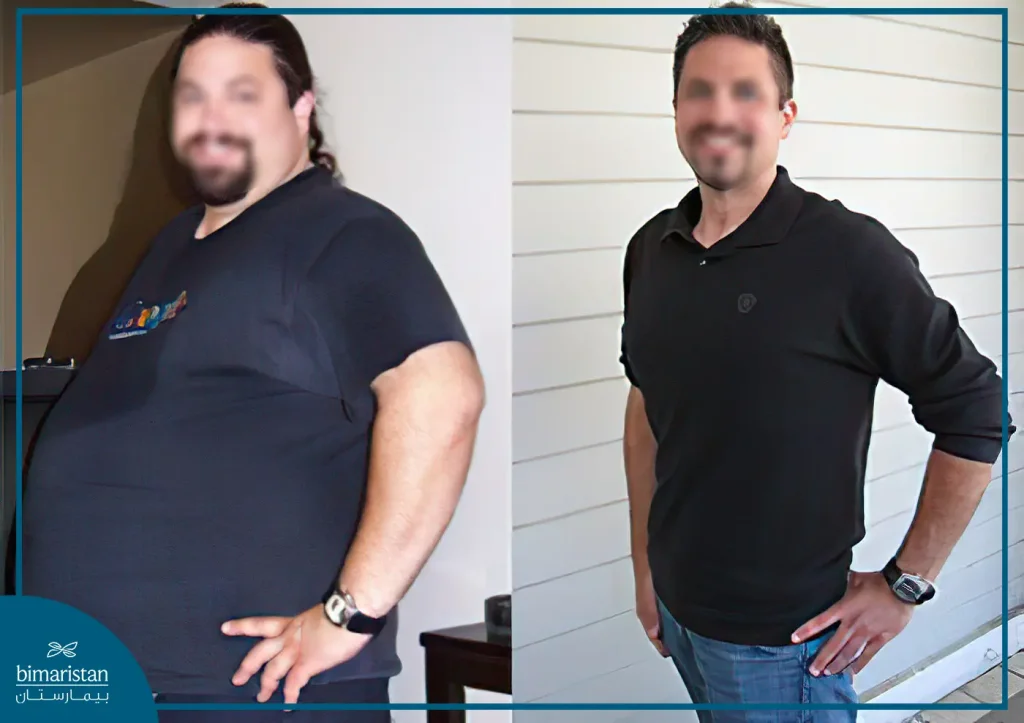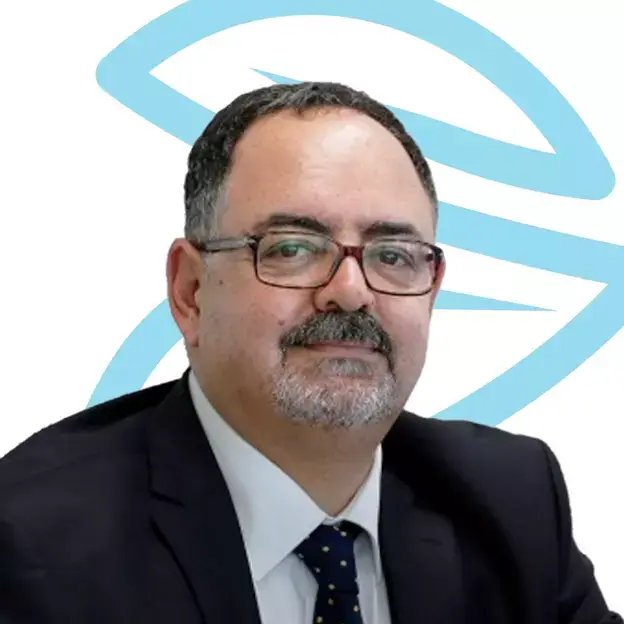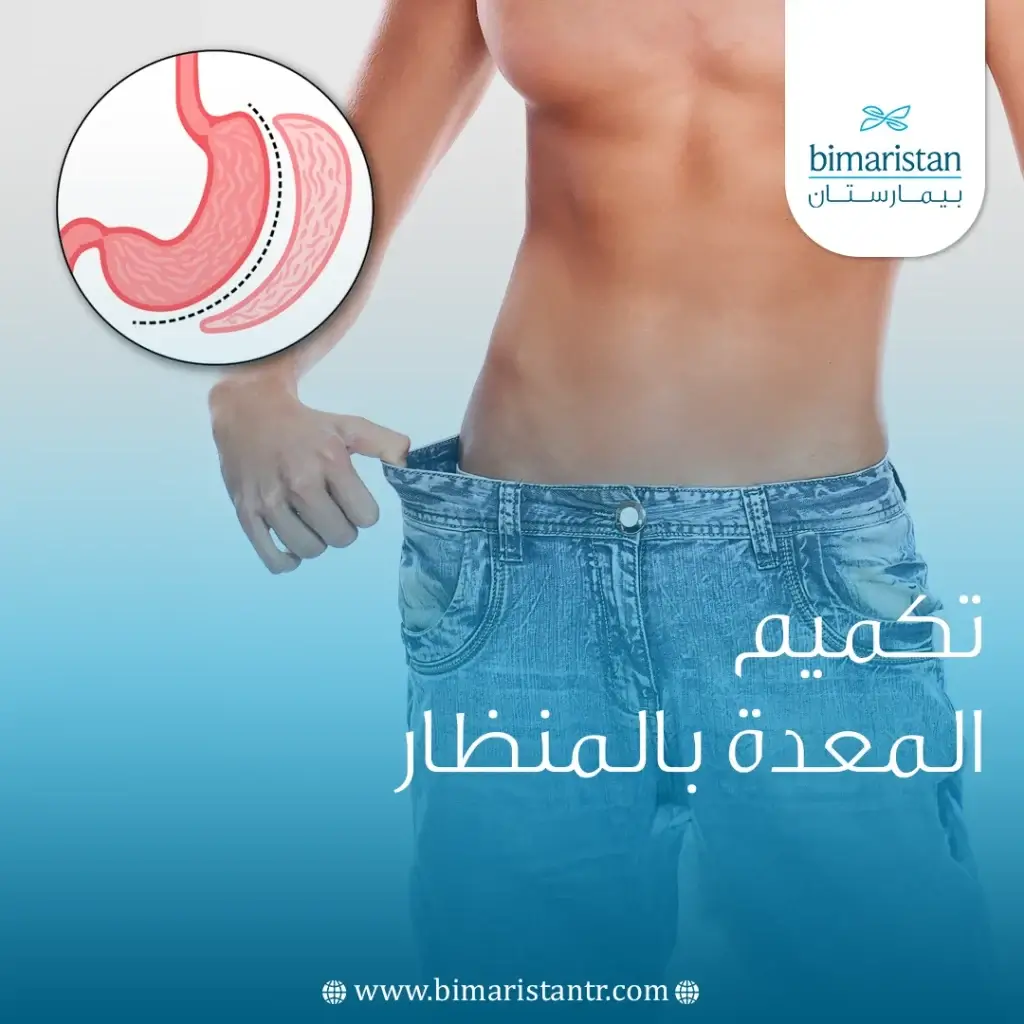تكميم المعدة في تركيا هو إجراء شائع يهدف لعلاج السمنة وتخفيف الوزن عند فئة كبيرة من المرضى بدون عناء كبير مع النظام الغذائي الصارم والتمارين المجهدة.
عملية التكميم هي من أفضل جراحات السمنة وأكثرها شيوعًا نظراً لنتائجها المميزة وقلة خطورتها فهي تتم باستخدام المنظار بدون الحاجة لعمل شقوق جراحية كبيرة وتعريض حياتك للخطر، ولا ننسى أيضًا التكلفة المنخفضة لعملية تكميم المعدة في اسطنبول والتي تقل بأضعاف عن التكلفة المتوقعة في الدول المجاورة.
الوصول لوزنك المثالي يعزز من صحتك الجسدية والنفسية، فقد ربطت الدراسات الحديثة بين البدانة وزيادة خطر الإصابة بالداء السكري وأمراض القلب وكذلك الاكتئاب وضعف الثقة بالنفس، لحسن الحظ أصبح بإمكانك خسارة ما يقارب 50% من وزنك الزائد عن طريق عملية التكميم في تركيا وبسعر منطقي فماذا تنتظر!
ما هو تكميم المعدة في تركيا؟
التكميم أو قص المعدة هو عبارة عن تصغير لحجم معدتك الطبيعي حتى تمتلئ المعدة بسرعة بالطعام وتشعر باكراً بالشبع مما يساعدك على خسارة الوزن بجهد أقل.
تعتمد جراحة التكميم على تقييد سعة المعدة فقط بدون التأثير على آلية امتصاص العناصر الغذائية كما هو الحال في عملية تحويل المسار وبعض جراحات السمنة المعتمدة على تغيير المجرى الطبيعي للأمعاء لإحداث سوء امتصاص للسعرات الحرارية.
يوجد في معدة الإنسان خلايا تقوم بإفراز هرمون “الغريلين” المسؤول عن الشهية والشعور بالجوع، فمن خلال تكميم المعدة وتصغير حجمها يقل إفراز هذا الهرمون وبالتالي تضعف شهيتك للطعام مما يساهم أيضاً في فقدانك للوزن.
تكميم المعدة في تركيا يجرى بمعدل يتجاوز 40000 عملية سنوياً، ولكن ما هي شروط إجراء هذه العملية المميزة وهل تناسب جميع الأشخاص الذين يعانون من البدانة؟
شروط إجراء عملية التكميم
يجب أن يكون مؤشر كتلة الجسم (BMI) قد تجاوز الـ 40 حتى يترشح المريض لعملية تكميم المعدة، بمعنى أن الوزن الحالي يزيد عن المجال الطبيعي بحوالي 40 كغ، وقد يتم قبول إجراء عملية تكميم المعدة لمن يعاني من مضاعفات صحية للسمنة كارتفاع الضغط والداء السكري أو انقطاع التنفس أثناء النوم حتى لو كان مؤشر BMI أقل من 40.
ومن الشروط التي يفضل توفرها ما يلي:
- المريض متحفز وقادر على الالتزام بنمط حياة صحي بعد عملية التكميم
- المقدرة على زيارة الطبيب بشكل دوري بعد جراحة تكميم المعدة
- عدم وجود أمراض ومشاكل تعيق إجراء العملية
في حال وجود مشكلة ما تمنعك من إجراء عملية تكميم المعدة أو عدم الرغبة بالخضوع لعمل جراحي يحمل بعض المخاطر يمكنك تجربة كبسولة بالون المعدة والتي تساعد على تخفيف الوزن بدون جراحة.
أنواع عمليات التكميم في تركيا
يمكن إجراء جراحة التكميم في تركيا عبر طريقتين وهما:
تكميم المعدة بالمنظار
أصبحت الجراحة التنظيرية الخيار المفضل لعملية التكميم كونها إجراء طفيف التوغل وقليل الخطورة بالمقارنة مع الجراحة التقليدية المفتوحة بالإضافة إلى سرعة التعافي وقلة الندبات التي تميز استخدام المنظار.
عبر بضعة شقوق جراحية صغيرة حول البطن يستطيع الجراح إدخال الأدوات الجراحية والمنظار مما يقلل من كمية النزف وشدة الألم مع احتمال أقل لحدوث المضاعفات المتعلقة بالجراحة كانتقال العدوى وتأخر اندمال الجرح.

تكميم المعدة بالجراحة المفتوحة
قل استعمال هذه الطريقة في تركيا بسبب انتشار التنظير وتفوقه بالنتائج والأمان على الجراحة التقليدية، فهذا الإجراء يحتاج لشق جراحي كبير حتى يتمكن الجراح من القيام بعملية التكميم وقص المعدة يدوياً، قد يتأخر اندمال الجرح ويترك ندبة مكانه كما أن المريض سيحتاج لراحة طويلة قبل العودة لممارسة نشاطاته اليومية.
مميزات وعيوب عملية تكميم المعدة في تركيا
تتميز عملية تكميم المعدة بنتائجها المرضية إذ تصل نسبة فقدان الوزن لأكثر من 60% من وزن المريض السابق خلال فترة سنتين، إلى جانب ذلك فإن جراحة التكميم تعتبر قليلة الخطورة وإجرائها أسهل من عمليات السمنة الأخرى كما أنها إجراء دائم لا يحتاج للإعادة كما هو الحال بعملية ربط المعدة أو تركيب البالون الذكي للتنحيف والذي يجب إزالته خلال فترة 6 أشهر.
يساهم تكميم المعدة بعلاج المشاكل الصحية المرتبطة بالسمنة، فقد أثبتت الدراسات فوائد عملية التكميم في تحسين حساسية الأنسولين عند مرضى السكري، التقليل من الحوادث القلبية الوعائية عند مرضى القلب، الوقاية من تشحم الكبد، تحسين وظائف الغدة الدرقية، علاج الشخير وانقطاع التنفس أثناء النوم، رفع الثقة بالنفس وتحسين المزاج.
بالنسبة لعيوب عملية تكميم المعدة فإنها قد تشمل ما يلي:
- اختلاطات متعلقة بالعمل الجراحي (النزف، العدوى، مشاكل التخدير)
- تشكل حصوات في المرارة بسبب التخلص السريع من الوزن
- ارتجاع المريء
- لا يؤثر تكميم المعدة على امتصاص السعرات الحرارية فقد يزداد الوزن مجدداً عند زيادة استهلاك الطعام
يمكن تقليل احتمال حدوث مضاعفات العمل الجراحي عند اختيارك لجراح خبير ضمن مركز متخصص، تواصل معنا لإرشادك لأفضل المراكز والجراحين في تركيا
التحضير قبل عملية التكميم
بعد تحديد موعد عملية تكميم المعدة ستخضع لفحوصات روتينية للتأكد من جاهزيتك التامة للإجراء، قد ينصحك الطبيب باتباع حمية غذائية قبل عمليتك بفترة محددة لخسارة بعض الوزن وتسهيل الإجراء، ويجب الامتناع بشكل تام عن الطعام والشراب قبل 12 ساعة من موعد العمل الجراحي لمنع ارتجاع مكونات المعدة أثناء التخدير واختناق المريض بها.
عادة ما يتم مناقشة الخطوات التي تلي عملية تكميم المعدة gastric sleeve كالنظام الغذائي والتعديلات الصحية على نمط الحياة حتى يكون الشخص على علم مسبق بمتطلبات عملية التكميم وشروط نجاحها، واختيارك لجراح خبير يزيد من نسب النجاح ويقلل من المضاعفات والآثار الجانبية المتعلقة بعملية تكميم المعدة.
كيف يتم إجراء عملية تكميم المعدة في تركيا؟
يتم تخدير المريض خلال العملية والتي عادة ما تستغرق 30 دقيقة إلى ساعة كاملة، بعد التخدير يقوم الجراح بعمل فتحات صغيرة بالبطن لإدخال المنظار والأدوات الجراحية اللازمة لاستئصال قسم من المعدة.
بعد إزالة جزء من المعدة وتصغير حجمها باستخدام خرز جراحية يتم سحب المنظار وخياطة الجروح، وعند الاستيقاظ من المخدر سيخبرك الطبيب ببعض التعليمات بخصوص مرحلة التعافي.
لمشاهدة فيديو توضيحي عن عملية التكميم في تركيا اضغط هنا.
النتائج والتوقعات بعد جراحة قص المعدة
ستبقى في المستشفى لمدة يوم إلى يومين للتأكد من نجاح العملية وخلوها من أية مضاعفات محتملة، يفضل الاقتصار على السوائل والطعام اللين في الأيام الأولى بعد عملية تكميم المعدة مع تجنب الأطعمة الصلبة لإراحة المعدة، وبعد مرور فترة وجيزة يمكنك العودة تدريجياً لتناول الطعام الصلب.
نظراً لصغر حجم المعدة بالمقارنة مع حالتها السابقة لا بد من القيام بتعديلات غذائية وعدم الإفراط في تناول الطعام بالوجبة الواحدة، سيخبرك الفريق الطبي ببعض النصائح والممنوعات بعد عملية التكميم.
كلما التزمت بتعليمات طبيبك بعد العملية كلما كانت النتائج أفضل في إنقاص الوزن بأقل وقت ممكن، فمن المتوقع خسارة حوالي 10% من الوزن الزائد خلال أول 6 أسابيع، وبعد مضي 3 أشهر يتم فقدان 15 لـ 20% من الوزن وقد تصل هذه النسبة خلال سنتين إلى 50% خاصة عند إشراك العملية مع الحمية والتمارين الرياضية.

تكلفة تكميم المعدة في تركيا 2024
تتميز تركيا بانخفاض أسعار العلاج مع تقديم خدمات طبية مميزة حيث يبدأ سعر عملية تكميم المعدة في تركيا من 2000 دولار أمريكي فقط وهذه التكلفة هي أقل بكثير من الدول المجاورة.
يمكنك التواصل معنا لطلب تفاصيل أكثر عن الأسعار ولإرشادك لأفضل المراكز والجراحين في تركيا لإجراء عمليات السمنة إذ يتألف فريق بيمارستان من مجموعة أطباء عرب وأتراك وأخصائيين بالتغذية يساعدون المرضى خطوة بخطوة في علاج السمنة وخسارة الوزن مع تأمين إجراءات السفر والإقامة في تركيا.
وختاماً فإن عملية تكميم المعدة في تركيا هي من أفضل الخيارات الجراحية لعلاج السمنة في الوقت الحالي، تعتبر هذه العملية قليلة الخطورة مع نتائج مميزة بفقدان الوزن وبتكلفة منخفضة نسبياً عند مقارنتها مع جراحات السمنة الأخرى.
المراجع:

